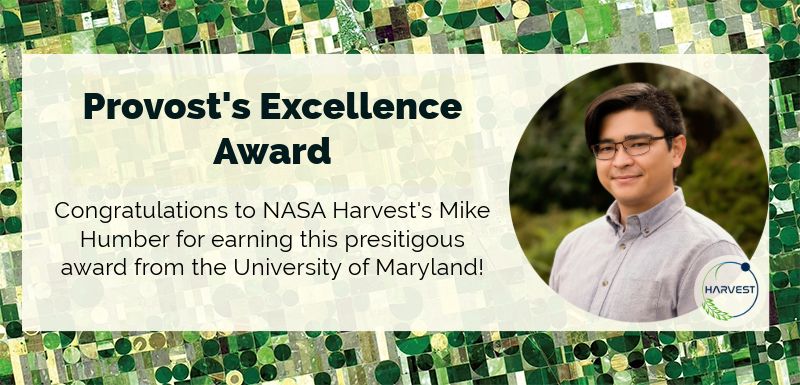UMD Honors NASA Harvest Scientist for Advancing Remote Sensing in Agriculture and Fire Monitoring
Associate Research Professor Michael Humber receives Provost’s Excellence Award for his leadership in satellite-based research that supports food security, climate resilience and wildfire response.
NASA Harvest, NASA’s Food Security and Agriculture Program led by GEOG researchers, is pleased to announce that Michael Humber has been selected to receive the University of Maryland’s prestigious Provost’s Excellence Award for Professional Track Faculty for his outstanding contributions and accomplishments in research. The award recognizes Humber’s impactful work in remote sensing and his leadership in advancing geospatial science for global and domestic applications.
Humber plays a critical role in two major NASA initiatives: he serves as Deputy Director of the NASA Acres consortium and Data Lead and Markets, Trade & Supply Chains Lead for the NASA Harvest consortium. He is also the Lead Scientist for Climate Smart Agriculture under the Climate Resilience Network, a UMD Grand Challenges project. These roles highlight his expertise in satellite-based agricultural and environmental monitoring. The award committee praised Humber for his commitment to research, his leadership, and innovation in remote sensing for agricultural monitoring and fire detection.

Agricultural Monitoring Using Remote Sensing
Humber’s agricultural research focuses on developing satellite-based data products that support agricultural decision-making on local, national, and global scales. Through his work with NASA Harvest and NASA Acres, he leads a team that designs data pipelines and applications using high-performance computing and cloud-native platforms. These tools deliver timely, accurate information to farmers, researchers, and humanitarian partners. His work emphasizes stakeholder engagement, promoting a collaborative user-focused research design that ensures the needs of local communities are met while improving the resilience of agricultural systems.
Wildfire Monitoring Using Remote Sensing
In the field of wildfire monitoring, Humber contributes to algorithm development and data validation for NASA’s official burned area products, including those derived from MODIS and VIIRS satellites. He is actively involved in making these datasets accessible for real-time fire response and long-term analysis. Additionally, he is leading the transition of Landsat-based fire detection systems to a cloud-based architecture on Amazon Web Services. This innovation will reduce costs and improve the speed of fire detection, supporting the operational needs of the NASA’s Fire Information Resource Management System (FIRMS) and enabling faster, data-driven responses to wildfires across North America.
This article was originally published on the NASA Harvest website.
Published on Wed, 05/07/2025 - 13:27


